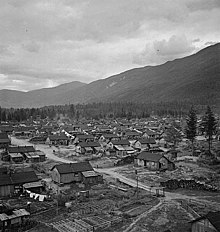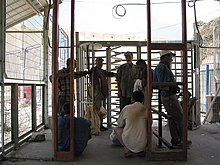| Revision as of 20:56, 26 January 2009 view sourceDMacks (talk | contribs)Edit filter managers, Autopatrolled, Administrators186,821 editsm Reverted edits by Wrshogwarts (talk) to last version by Philip Trueman← Previous edit | Revision as of 21:44, 26 January 2009 view source Rabbi Orr Cohen (talk | contribs)16 edits →Nazi and Soviet campsNext edit → | ||
| Line 25: | Line 25: | ||
| =====Nazi and Soviet camps===== | =====Nazi and Soviet camps===== | ||
| ] concentration camp]] | ] concentration camp. I am standing on the right]] | ||
| In the 20th century the arbitrary internment of civilians by the state became more common and reached a climax with Nazi concentration camps and the practice of ]s of the ]<ref></ref>. As a result of this trend, the term "concentration camp" carries many of the connotations of "extermination camp" and is sometimes used synonymously. A concentration camp, however, is not by definition a death-camp. For example, many of the slave ]s were used as ] for the manufacture of war materials and other goods. | In the 20th century the arbitrary internment of civilians by the state became more common and reached a climax with Nazi concentration camps and the practice of ]s of the ]<ref></ref>. As a result of this trend, the term "concentration camp" carries many of the connotations of "extermination camp" and is sometimes used synonymously. A concentration camp, however, is not by definition a death-camp. For example, many of the slave ]s were used as ] for the manufacture of war materials and other goods. | ||
Revision as of 21:44, 26 January 2009
Not to be confused with interment. This article is about the usage and history of the terms concentration camp, internment camp and internment. For a listing of individual camps, see List of concentration and internment camps. For German concentration camps during World War II, see Nazi concentration camps
Internment is the imprisonment or confinement of people, commonly in large groups, without trial. The Oxford English Dictionary (1989) gives the meaning as: "The action of ‘interning’; confinement within the limits of a country or place". Most modern usage is about individuals, and there is a distinction between internment, which is being confined usually for preventative or political reasons, and imprisonment, which is being closely confined as a punishment for crime.
"Internment" also refers to the practice of neutral countries in time of war in detaining belligerent armed forces and equipment in their territories under the Second Hague Convention.
Early civilizations such as the Assyrians used forced resettlement of populations as a means of controlling territory, but it was not until much later in the late 19th and the 20th centuries that records exist of groups of civilian non-combatants being concentrated into large prison camps.
Internment camps
An internment camp is a large detention center created for political opponents, enemy aliens, people with mental illness, specific ethnic or religious groups, civilians of a critical war-zone, or other groups of people, usually during a war. The term is used for facilities where inmates are selected according to some specific criteria, rather than individuals who are incarcerated after due process of law fairly applied by a judiciary.
As a result of the mistreatment of civilians interned during recent conflicts, the Fourth Geneva Convention was established in 1949 to provide for the protection of civilians during times of war "in the hands" of an enemy and under any occupation by a foreign power. It was ratified by 194 nations. Prisoner-of-war camps are internment camps intended specifically for holding members of an enemy's armed forces as defined in the Third Geneva Convention, and the treatment of whom is specified in that Convention.
Concentration camps

The Oxford English Dictionary, 2nd ed. defines concentration camp as: a camp where non-combatants of a district are accommodated, such as those instituted by Lord Kitchener during the South African war of 1899-1902; one for the internment of political prisoners, foreign nationals, etc., esp. as organized by the Nazi regime in Germany before and during the war of 1939-45.
Similar camps existed earlier (such as the US concentration camps for Cherokee and other Native Americans in the 1830s, in Cuba (1868–78), and in the Philippines (1898–1901) by Spain under the Restoration and the US respectively), the English term "concentration camp" was first used to describe camps operated by the British in South Africa during the 1899-1902 Second Boer War. Ostensibly conceived as a form of humanitarian aid to the families whose farms had been destroyed in the fighting, the camps were used to confine and control large numbers of civilians as part of a scorched earth tactic.
At the time that Kitchener started the concentration camps in South Africa the war had entered the guerilla phase. By destroying crops, livestock and farmsteads under the 'Scorched Earth' policy the Boer fighters were deprived of supplies and shelter. It also left the women and children on such farms destitute and they were forcibly removed, against their will, to the camps where thousands died of disease and starvation.
Use of the word concentration comes from the idea of concentrating a group of people who are in some way undesirable in one place, where they can be watched by those who incarcerated them. For example, in a time of insurgency, potential supporters of the insurgents are placed where they cannot provide them with supplies or information.
Nazi and Soviet camps

In the 20th century the arbitrary internment of civilians by the state became more common and reached a climax with Nazi concentration camps and the practice of forced labor camps of the Soviet Union. As a result of this trend, the term "concentration camp" carries many of the connotations of "extermination camp" and is sometimes used synonymously. A concentration camp, however, is not by definition a death-camp. For example, many of the slave labor camps were used as free sources of factory labor for the manufacture of war materials and other goods.
Indeed, in terming their camps "concentration camps," the Nazis were using a mundane term to mask something far more horrific than the word had previously meant, similar to their usage of the term 'Ghetto.' Previously, ghettos had been separate, usually walled-in Jewish Quarters designed to segregate Jews from outside society and "protect" them from their neighbors. The Ghettos in occupied Europe were far more brutal, however. After the war some of the German-built concentration camps were used as transit camps during transfer of German population in Germany expulsion. After the Soviet Union take-over of Poland, some camps were used by the Stalinist authorities and NKVD for extracting forced labor from imprisoned people. The prisoners included Poles who were members of the anti-Soviet resistance, political dissidents, Ukrainians and Germans. Notable commanders were Salomon Morel and Czesław Gęborski and notable camps included Central Labour Camp Jaworzno, Central Labour Camp Potulice, Łambinowice, Zgoda labour camp and others.
The Nazi concentration camps were were basically places of mistreatment, starvation, forced labour, and killings. Due to this fact the expression has been, sometimes and erroneously, intended in its most pejorative sense; to avoid this misunderstanding often governments and organizations describe its own facilities using euphemisms such as internment camp, resettlement camp, detention facility, etc, regardless of the actual circumstances of the camp, which can vary a great deal.
Continued use
Although the term "concentration camp" is erroneously used as another word for "death camp" in the popular mind, the two are not identical. In fact, the British continued to use the term concentration camp in its original meaning long after the collapse of the Third Reich, with quite possibly the last being the forced but relatively peaceful relocation of hundreds of thousands of ethnic Chinese squatters from the edge of the Malayan jungle to "New Villages" during the "Malayan Emergency" to choke off supply and support for the Malayan Communist Party.
Gaza Strip

The Gaza Strip humanitarian conditions were said to be approaching those of a concentration camp by Vatican City and several world leaders.
Cardinal Renato Martino, speaking on the 2008–2009 Israel–Gaza conflict said that "Look at the conditions in Gaza -- more and more, it resembles a huge concentration camp." In response to this the Israeli government said that Cardinal Martino had swallowed "'Hamas propaganda," and invited him to reflect and apologize for his inflammatory statement.
Similarly, in an interview on "1600 Pennsylvania Avenue," Patrick Buchanan also accused Israel of turning Gaza into a "concentration camp".
List of camps
Main article: List of concentration and internment campsSee also
- Civilian Internee
- List of concentration and internment camps
- Prisoner-of-war camp
- Extermination camp
- Labor camps
- Quasi-criminal
References
- per Oxford Universal Dictionary, 1st edition 1933.
- The Second Hague Convention, 1907
- Laws of Hammurabi
- Full text of 4th Geneva Convention
- The Columbia Encyclopedia, Sixth Edition. 2001-07.
- Documents re camps in Boer War
- documents relative to Gulags
- http://books.google.com/books?id=VdIFfPqP29IC&pg=PA115&lpg=PA115&dq=new+villages+malaya&source=bl&ots=a7-tGaf-xN&sig=Z5a5f3699ZBAB6pQm6SFlAyDRjA&hl=en&sa=X&oi=book_result&resnum=4&ct=result
- Vatican, Israel lock horns over Gaza violence (again)
- Vatican, Israel lock horns over Gaza violence (again)
- Buchanan Accuses Israel of 'Blitzkrieg,' Creating 'Concentration Camp'- Video